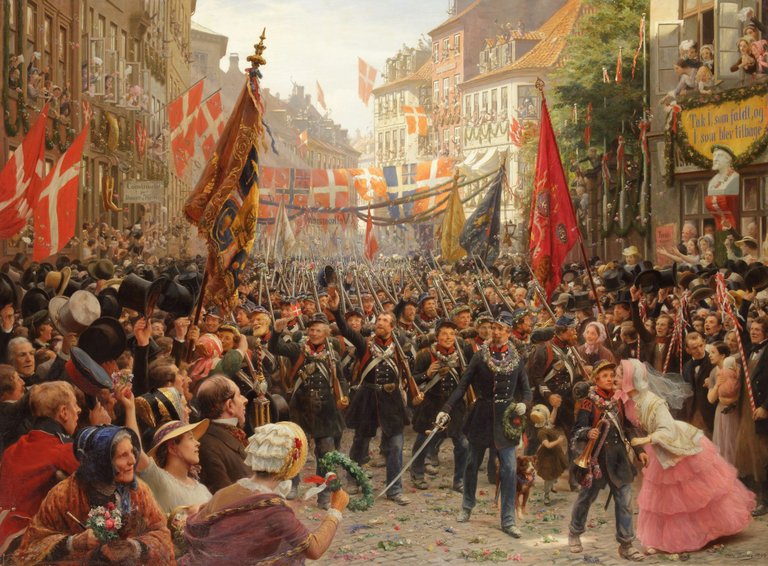On 21st of January last year, European populist, far right leaders, met in Koblenz, Germany, to strenghten connections between their parties. The meeting was organized by Germany's Alternative fur Deutschland (AfD) party and also present were Marine le Pen, then French presidential candidate and Geert Wilders who was to take part in Dutch parliamentary elections. It was an optimistic time for right wing populists in Europe, after Donald Trump won in United States, Brits decided to leave the EU in 2016 and opinion polls across Europe showed strenghtening of anti immigrant, anti EU forces.
One could describe the meeting as founding of a right wing, populist and nationalist international, under the slogan 'Freedom for Europe'.
2017 didn't bring Marine le Pen as president of France and Geert Wilders didn't win in the Netherlands, but the continued push by such forces was obvious. They were strenghtening their position. But, could nationalists ever create a stable international order, once in power? Could a German, French and Italian nationalist peacefully exist side by side? As long as they were partners in fighting the ruling elites and together opposed muslim migration, yes, but what would happen, if they all took power at the same time?
Maybe the case of Poland and Ukraine can shed some light on it. Both countries are united in their opposition, to what they call Russian agression. Ukraine is waging a war on part of its teritory in the east against pro Russian rebels and Crimea has allready been anexed by Russia. Poland supports its neighbour. Yet, a contentious issue has arisen between both countries, treatening to worsen relations and it has to do with nationalism.
Polish Parliament adopted a controversial law, and the president signed it, prohibiting so called Bandera ideology. Under the same law, anyone blaming Poles of colaborating with Germans in extermination of Jews and so offending the Polish nation, will be punished. This law allready drew criticism from both United States and Israel. As The New York Times reported, Poland even canceled a visit by Israel's education minister, Naftali Bennett. 'The blood of Polish Jews cries from the ground, and no law will silence it,' the minister responded.
Nationalism is strong in Ukraine and remembrance of Stepan Bandera a key part of it. Stepan Bandera is considered a hero, while in Russia and Poland he is seen as a nazi colaborator. While Ukraine doesn't care much about Russian objections, it does have a problem with Poland, a key ally.
Stepan Bandera was a leader of the nationalist and independence movement of Ukraine. He was allied to nazi Germany at the begining of German invasion of Soviet Union, but soon after tried to declare an independent Ukrainian state, thereby falling from German grace. He was imprisoned and released only after Germany started rapidly to retreat on the eastern front in 1944, in hopes he would fight against Soviets. Poland blames him and the organisation called UPA (Ukrainian Insurgent Army) for massacres of Poles in Volhynia and Eastern Galicia in which up to 100000 Poles were killed. So, while Ukrainian nationalists march with torches through Ukraininan cities on the first day of the New Year, celebrating the birthday of their hero, that has a chilling effect on Poles.
As long as Poland and Ukraine can focus on a common enemy, Russia, all can be fine, but when that enemy is taken out of the picture and historical animosities resurface, there is tension. Nationalism is key in this.
It is hard to believe, an era of nationalistic governments throughout Europe, everyone of them wanting to make their country 'great again', would bring peace and cooperation. Nationalistic international seems highly unlikely. Sooner or later, all historic grievances would return and besides, in trying to make their countries as strong as possible, each leader would clash with the leader of some other country, trying to do the same. 'Freedom for Europe' would turn out more like 'competition in Europe'. Trying to stop migrations would most likely not stop with muslim immigrants and refugees, but would extend to people from other European countries.
Poles in United Kingdom would become unwelcome, people from the Balkans in Germany and so on, adding to tensions between countries. European Union is a deeply flawed project, but there is no denying it, it brought unprecedented peace and stability, as it was based on cooperation, not competition, from the beginning. Brought down, with borders reestablished, with trade barriers and states moving to strenghten their armed forces, it would be a return to an era, when war was a real possibility of settling open questions. Maybe right wing, nationalistic and populistic leaders don't see it this way at the moment, hoping they can create a new Europe, with sovereignty returned to nation states and flourishing cooperation between them, but it all seems naive and fraught with danger.
 Danish soldiers return to Copenhagen , 1849
Danish soldiers return to Copenhagen , 1849